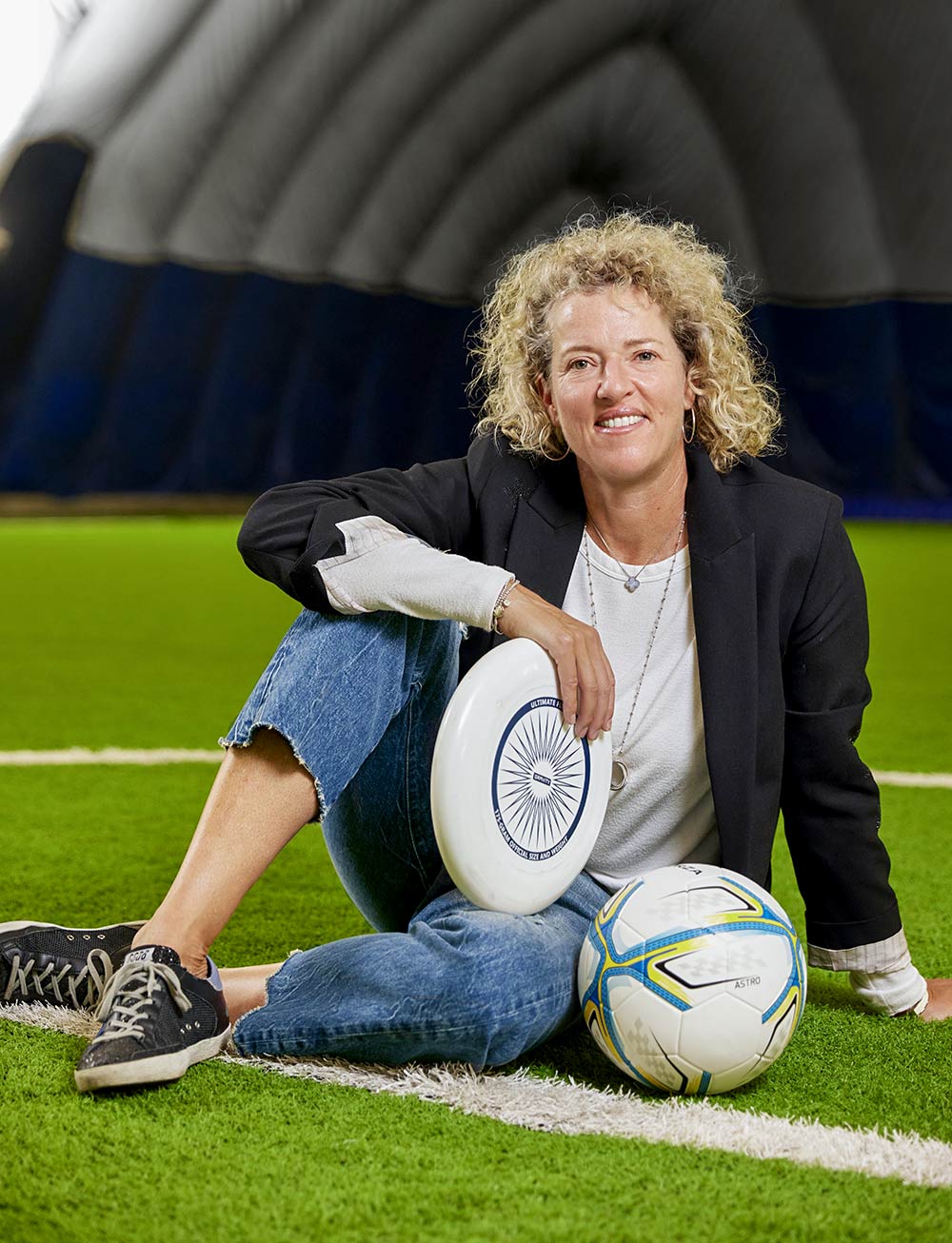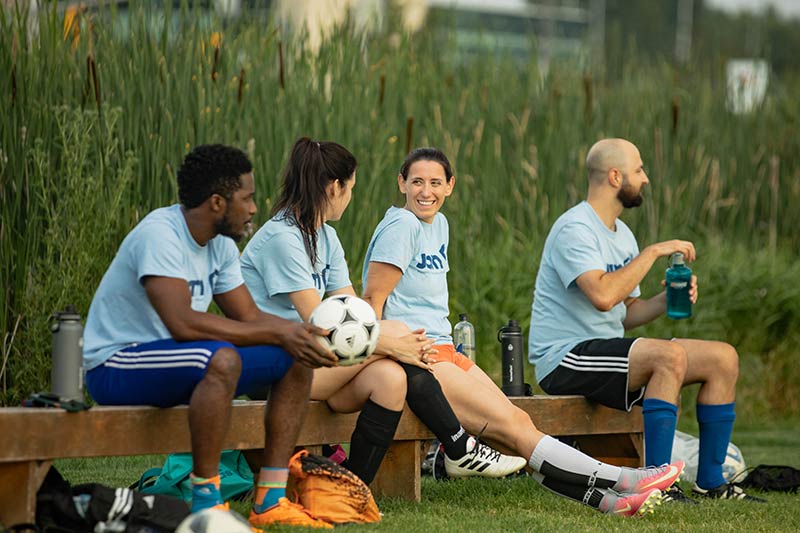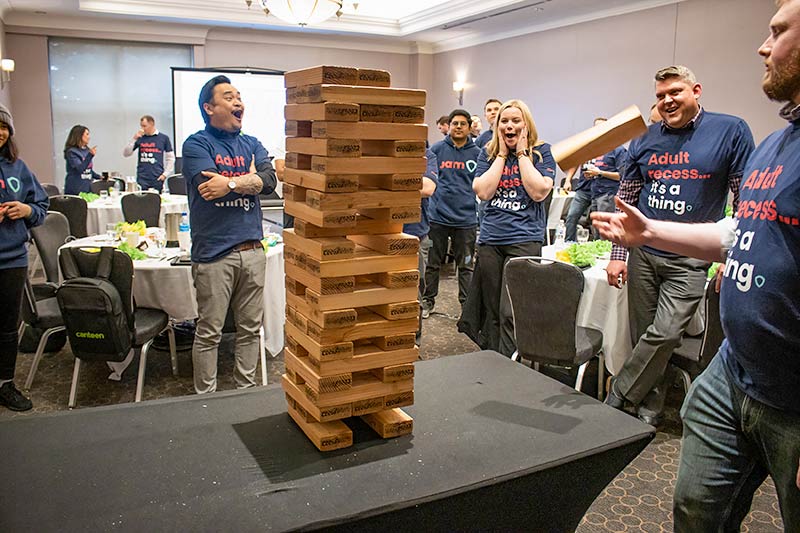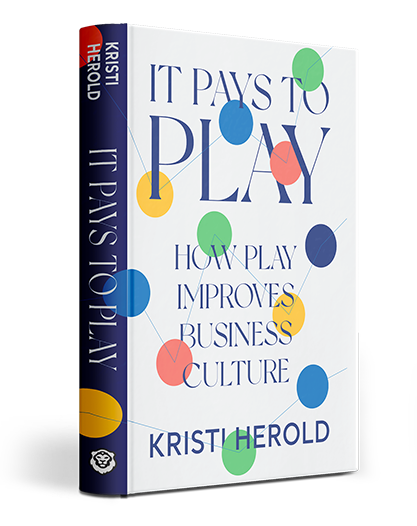The work of play

Kristi Herold, CEO of JAM
The worst day of Kristi Herold’s professional life happened in paradise. Herold and her middle child had flown to Mexico early in the second week of March 2020, for a long-planned group holiday to celebrate the latter’s upcoming high school graduation. It was supposed to be a week of fun and relaxation. Within hours of arrival, the Covid-19 pandemic escalated from a vague threat to acute global crisis, plunging Herold—as founder and CEO of Sport & Social Group, an adult recreational sports company running leagues for hundreds of thousands of players in 12 cities across North America—into the ominous work of preparing for the unprecedented.
As her daughter and friends made the most of the beach resort, Herold shuttered herself in her room, fielding calls and triaging the rapidly evolving situation. As a joiner by nature and a games-monger by profession, missing out on the fun was a drag. But that paled next to the ever-bleaker prognosis facing the business she’d been building for 25 years. Sport & Social Group’s core work was enabling groups of people to congregate, sweat and share food and drink—normal “before times” activities rendered suddenly, nauseatingly verboten as governments and health authorities scrambled to contain the virus.
By Wednesday the 11th, Herold—like countless leaders around the world—had mapped out several contingency plans for how her company would respond, ranging from moderate to severe. In the highly unlikely worst-case scenario, Sport & Social Group would have to halt all programming and temporarily lay off all but 14 of its 40-person team.
Less than 48 hours later, on Friday (the 13th, by grim coincidence), Herold found herself on an all-hands video call doing just that. “It was shocking. It was that quick,” she recalls. “I had to tell my team, ‘This is our reality. We don’t know what’s going to happen, but we have to stop our operations immediately.’ ”
The next few months passed in a blur of uncertainty and helplessness. Back home in Ontario, Herold’s natural energy and ebullience disappeared; many days she struggled to get out of bed. “I was a complete mess,” she says. “I just didn’t know how we were going to survive it.”
But Herold isn’t one to sit on the bench for long. By May, the entrepreneurial verve that had powered her since she was a teen started to return. Sure, the in-person sports that had fuelled Sport & Social Group’s success were temporarily impossible. But fun was still allowed. In fact, it felt more essential than ever.
So Herold did what she does best: She found new ways to play.
Kristi Herold was a go-getter from the jump. She grew up playing pretty much every sport available to an energetic kid in Sudbury, Ont., signing up for whatever she could convince her mom (a homemaker) or dad (an entrepreneur) to drive her to: soccer, basketball, volleyball. As a teen, she was both a competitive ski racer and the quarterback of her high school flag football team.
The Herold home valued work as much as play. Dinner conversations were as likely to centre on finances and how to run an independent business as the results of that day’s games. These conversations helped shape a can-do worldview in the young Herold. She started a business cutting lawns before she could drive, going door to door to drum up clients “as far as I could push my mower.” Within a year, she’d bought a few used machines and hired a couple of neighbourhood kids. The quick growth of her modest horticultural empire brought with it a revelation: She loved running a business. “My world opened up,” she says. Suddenly, she had a plan: After high school, she would study business and become an entrepreneur.
She squeaked into the Commerce program and arrived on campus, keen and green, in the fall of 1989. On the first day of Introduction to Business, Professor Frank Collom asked students how many had designs to run their own companies. Herold was the only one of 200 to raise her hand. “I remember thinking ‘wait, why are you guys here?’ ” she laughs. “I was so confused. They all wanted to get into finance and investment, and I didn’t even know what that meant.”
In addition to a full course load, she plunged into non-academic pursuits, including competing on both the rowing and ski teams and starting up two side businesses, one of which was her own College Pro painting franchise, which she describes as “a real entrepreneurial training ground.”
This was not without its trade-offs. By the end of first year, her average had dropped enough to warrant a call to the dean’s office. Ease up on the extracurriculars, he warned, and focus more on the books. She acquiesced to drop rowing but stuck on the ski team. The dean didn’t know about the businesses, so she kept them going, too, earning Canada-wide College Pro manager of the year awards three years running. “My marks never, ever got better,” she says with a smile. “But I had a great four years.”
After graduating in 1993, she moved to Toronto. As a “small town girl living in the lonely world” of the big city, she (naturally) sought out sports to make friends—by then, she’d added tennis and ultimate frisbee to her repertoire—but struggled to find anything that wasn’t a) competitive and b) for kids. She was getting itchy in her day job—she was then on the College Pro payroll, serving as general manager for several franchises—and was ready to do something of her own. She’d heard of organizations in San Francisco and Chicago that organized adult rec league sports, where groups of folks could have some fun on a field and then grab some drinks and snacks after. Like intramurals for grown-ups, but with beer. What if she tried to get something like that going in Toronto? Thus was born Toronto Sport & Social Club (later known as Sport & Social Group). “I never had a vision for it becoming what it has become,” Herold says. “I just wanted my own lifestyle business. And frankly, I thought it would be fun.”
The expectation of fun was put to the test when she actually had to find paying players. In 1996, client acquisition took considerably more grit than hitting “send” on an email or “post” on an Instagram ad. Herold spent four months calling everyone in her address book and asking them if they wanted to sign up. If someone said yes, she’d ask them to share their address book, and then she’d cold-call every stranger listed within. She printed 800 flyers, but could only afford 400 stamps, so she enlisted her boyfriend, a semi-pro cyclist named Rolston Miller, Artsci’92, (who became her business partner, then her husband, then her amicable ex-husband—he maintains the first and third role today) to ride across Toronto to hand-deliver the other half.
The grassroots hustle worked: 52 teams signed up for the first season. It was an intense time. Herold was spending 16 hours a day on the job, doing everything from bookkeeping to HR to selling sponsorships to checking in on the matches. But it was invigorating. She’d clearly tapped into something. The need to play doesn’t go away with jobs and mortgages; adults should get to have fun, too. Sport & Social made it easy: no need to bother with scheduling or logistics. All players had to do was amass a group of pals or co-workers—or agree to be grouped with strangers—and show up. “People really loved what we were doing,” Herold says. “They were having fun and they were connecting with others. Everything about it felt so positive. Then they’d tell their friends, and they’d tell their friends.” By the end of the first year, when the number of teams enrolled had quintupled to 250, she realized the business could be much bigger than her initial ambitions. “I was like, ‘OK, wow, we really have something here.’ ”


Kristi Herold’s JAM promotes the power of play, whether through its adult sports leagues or its in-person and online corporate events
Powered largely by word-of-mouth, Sport & Social Group grew steadily for a decade, adding more teams, entering new Ontario markets and hiring a larger team (including now-president Rob Davies, BCom’98, who joined in 1999). It chugged along steadily and healthily for 10 years after that, even as Herold stepped back a bit to spend more time with her three young kids and dabble in other interests (including founding a community musical theatre group, called Bedford Park Players, whose shows raised more than half-a-million dollars for charity). The business is responsible for innumerable marriages, friendships and, in Herold’s estimation, “thousands of babies.” Some teams that formed in the ’90s still play together today. It is not an exaggeration to say Sport & Social Group has changed lives.
By 2016, with her children older and more independent, Herold was “a bit bored” and ready for a new challenge. She briefly considered selling the business but opted instead for some deep soul-searching about her motivations and her desired legacy. “I wanted to think about what brings me joy,” she recalls. “And I realized what brings me joy is driving down the street and seeing people playing soccer or ultimate frisbee or flag football and knowing that they are there because of our company. It brings me so much joy. And I wanted to do more of it.” So she turned her full energy back to the business and crafted an ambitious growth plan: to enrol one million players annually, and to do so by acquiring other regional operations. “Our industry is very fragmented, and we had grown into one of the largest operators in North America,” she explains. “We’re really good at customer service, and we have a really strong culture. I thought, ‘there’s an opportunity here.’ ”
Sport & Social Group completed eight acquisitions between 2017 and March of 2020 (including into the U.S.), with two more that would have doubled the company’s size in due diligence when Herold boarded the plane to Mexico and, as she puts it, “got hit in the face with a frying pan.”
It was hard, initially, for Herold to wrap her head around a pandemic pivot that would work for Sport & Social Group. One of her two brothers, Cameron—himself a successful business coach and author (cameronherold.com)—suggested she look into offering virtual classes. Herold was skeptical: “You can’t play beach volleyball over your phone,” she remembers thinking. But she didn’t have the luxury of meticulous strategy. She and her skeleton staff needed to find ways to bring in money, and fast. What could they do that would deliver the convivial spirit of the company to laptops and phones?
The team started by offering a few activities to Sport & Social Group participants that they figured might translate well to the new Zoom reality: trivia, bingo, scavenger hunts, even speed dating. The good cheer and friendly competition of these sessions proved to be a welcome reprieve from the isolation, unease and sheer boredom of lockdown life. Teammates were missing one another and craving connection, Herold realized, and not just sports teammates. Maybe, she thought, work teammates needed this kind of thing, too; maybe these virtual games could give co-workers a chance to reconnect and have a few laughs.
Sport & Social Group had always been a consumer-facing outfit; transforming into a business-to-business operation was a shift, ideologically and practically. One long-term employee called Herold in disbelief: “Let me get this right,” he said. “We’re selling bingo? To companies?” It felt surreal and a bit impossible—but then a lot of things did that spring. So Herold and her team invoked the spirit of 1997 and started working their contact lists. It turned out many Sport & Social Group players managed people at work and were open to trying the new offering. It was simple (“we built it to be turnkey,” Herold says), it was fun, and it was a hit. In the months that followed, the company hosted more than 1,000 virtual events for corporate teams in 25 countries and adopted a new name, JAM, to better encapsulate its mandate to connect people through different types of play—not just sports.
The value of fun at work is well documented. When people find joy and mirth in the office, they’re proven to be more likely to feel engaged, find purpose and stick around. These things mattered before Covid, of course. But the sudden, shocking introduction of remote work, coupled with the deleterious effect of the pandemic on employee mental health, assigned new importance to workplace happiness.
With no way to replicate the spontaneous moments of levity that can occur when folks walk the same bit of carpet each day—a laugh over the coffee machine, a funny elevator experience—it fell to bosses to manufacture fun, and many had neither the bandwidth nor the temperament to do it well.
Professor Matthias Spitzmuller, who teaches organizational behaviour at Smith, says that many employees have experienced “a bit of a crisis” surrounding their work identities since the start of the pandemic, feeling physically and mentally removed from their jobs. “If your employees feel less belongingness, you have to offer them something that can compensate for that,” he explains. “What can you offer to connect them to one another? Team-building activities can really serve an important function to do that.”
Hence the appeal of bringing in JAM’s professional merrymakers. As outside facilitators, they can transcend organizational drama, drum up enthusiasm and tease out silliness. It makes fun a priority, and for Herold, that’s where the magic happens.
“When we play,” Herold says, “we strengthen friendships and bonds, and we are then that much more trusting of our colleagues. We’re more willing to be vulnerable. We’re more willing to be creative and innovative around them. We’ll throw ideas out because we trust them not to hurt us. And that happens because we’ve built these friendships through a little playtime.”
Today, Herold’s days are filled with building up JAM, which now comprises two divisions: one for sports leagues (the rec sports activities of Sport & Social Group have returned, in active recovery mode after 16 months of lost revenue during lockdown) and one for corporate events (now offering an ever-evolving range of in-person, virtual and hybrid events to meet the changing needs of employers). “At times, it feels like I have a 27-year-old who just got off of two years of life support, and a two-year-old toddler that keeps changing its mind about what it wants to do,” Herold laughs.
Outside of work, she practices what she preaches, filling her life with things that spark joy. She hikes, bikes and does yoga. A few years ago, she picked up the guitar, a hobby she finds “meditative.” This past August, she paddled the Nahanni River in the Northwest Territories and then flew to Poland to watch her son (Dax Miller, Artsci’26) compete in the world championships of ultimate frisbee. She’s constantly planning weekend getaways for friends and activities with her husband, kids and “bonus-kids.” She recently wrote her first book. It’s called It Pays to Play: How Play Improves Business Culture.
Does it never get tiring, this business of play? “I do best when I’m busy,” Herold reflects. “If I get bored, that’s a dangerous place for me to be.”
And as she sees it, fortune—however you choose to define it—favours those who opt in.
“I’m a big believer in saying yes to opportunities,” she says. “We create our own luck by walking through the doors that open in front of us. If you don’t, you’ll never know what’s on the other side.”
5 ways to play at work
Kristi Herold’s tips for creating joyous team building activities at work
1. Make it fun
Choosing interactive activities—like Family Feud-style game shows or group scavenger hunts—creates the kinds of laughs and friendly competition that builds camaraderie.
2. Make it regular
Like any good habit, repetition deepens the positive effects of play. Herold recommends monthly scheduled sessions—ideally, with a running leaderboard for player and/or team scores—for best results.
3. Make it cross-functional
Organizations see the best benefit when activities aren’t siloed by function or by team. “It’s a really great way for very junior people to connect with very senior people, and vice-versa,” Herold says.
4. Make it optional
Some folks just aren’t into structured fun and games, and mandating it can be counterproductive. “I always tell companies to encourage it, but not to force it,” Herold says.
5. Make it safe to be silly
To play is to be goofy, and that can be tough in a professional setting. Outside facilitation (like that provided by JAM) encourages openness and reduces hang-ups.
